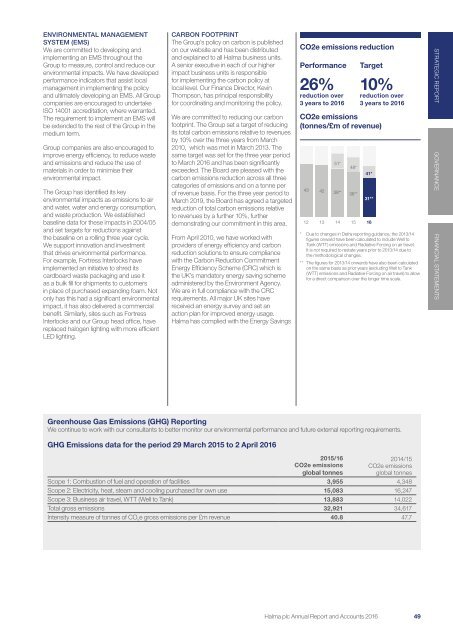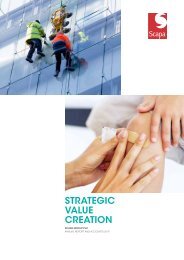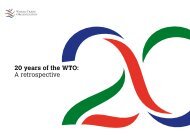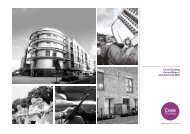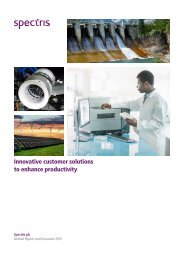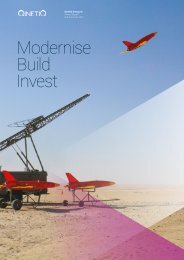You also want an ePaper? Increase the reach of your titles
YUMPU automatically turns print PDFs into web optimized ePapers that Google loves.
ENVIRONMENTAL MANAGEMENT<br />
SYSTEM (EMS)<br />
We are committed to developing and<br />
implementing an EMS throughout the<br />
Group to measure, control and reduce our<br />
environmental impacts. We have developed<br />
performance indicators that assist local<br />
management in implementing the policy<br />
and ultimately developing an EMS. All Group<br />
companies are encouraged to undertake<br />
ISO 14001 accreditation, where warranted.<br />
The requirement to implement an EMS will<br />
be extended to the rest of the Group in the<br />
medium term.<br />
Group companies are also encouraged to<br />
improve energy efficiency, to reduce waste<br />
and emissions and reduce the use of<br />
materials in order to minimise their<br />
environmental impact.<br />
The Group has identified its key<br />
environmental impacts as emissions to air<br />
and water, water and energy consumption,<br />
and waste production. We established<br />
baseline data for these impacts in 2004/05<br />
and set targets for reductions against<br />
the baseline on a rolling three year cycle.<br />
We support innovation and investment<br />
that drives environmental performance.<br />
For example, Fortress Interlocks have<br />
implemented an initiative to shred its<br />
cardboard waste packaging and use it<br />
as a bulk fill for shipments to customers<br />
in place of purchased expanding foam. Not<br />
only has this had a significant environmental<br />
impact, it has also delivered a commercial<br />
benefit. Similarly, sites such as Fortress<br />
Interlocks and our Group head office, have<br />
replaced halogen lighting with more efficient<br />
LED lighting.<br />
CARBON FOOTPRINT<br />
The Group’s policy on carbon is published<br />
on our website and has been distributed<br />
and explained to all <strong>Halma</strong> business units.<br />
A senior executive in each of our higher<br />
impact business units is responsible<br />
for implementing the carbon policy at<br />
local level. Our Finance Director, Kevin<br />
Thompson, has principal responsibility<br />
for coordinating and monitoring the policy.<br />
We are committed to reducing our carbon<br />
footprint. The Group set a target of reducing<br />
its total carbon emissions relative to revenues<br />
by 10% over the three years from March<br />
2010, which was met in March 2013. The<br />
same target was set for the three year period<br />
to March <strong>2016</strong> and has been significantly<br />
exceeded. The Board are pleased with the<br />
carbon emissions reduction across all three<br />
categories of emissions and on a tonne per<br />
of revenue basis. For the three year period to<br />
March 2019, the Board has agreed a targeted<br />
reduction of total carbon emissions relative<br />
to revenues by a further 10%, further<br />
demonstrating our commitment in this area.<br />
From April 2010, we have worked with<br />
providers of energy efficiency and carbon<br />
reduction solutions to ensure compliance<br />
with the Carbon Reduction Commitment<br />
Energy Efficiency Scheme (CRC) which is<br />
the UK’s mandatory energy saving scheme<br />
administered by the Environment Agency.<br />
We are in full compliance with the CRC<br />
requirements. All major UK sites have<br />
received an energy survey and set an<br />
action plan for improved energy usage.<br />
<strong>Halma</strong> has complied with the Energy Savings<br />
CO2e emissions reduction<br />
Performance<br />
26%<br />
reduction over<br />
3 years to <strong>2016</strong><br />
Target<br />
10%<br />
reduction over<br />
3 years to <strong>2016</strong><br />
CO2e emissions<br />
(tonnes/£m of revenue)<br />
51*<br />
48*<br />
43 42 39** 36**<br />
41*<br />
31**<br />
12 13 14 15 16<br />
* Due to changes in Defra reporting guidance, the 2013/14<br />
figures onward have been calculated to include Well to<br />
Tank (WTT) emissions and Radiative Forcing on air travel.<br />
It is not required to restate years prior to 2013/14 due to<br />
the methodological changes.<br />
** The figures for 2013/14 onwards have also been calculated<br />
on the same basis as prior years (excluding Well to Tank<br />
(WTT) emissions and Radiative Forcing on air travel) to allow<br />
for a direct comparison over the longer time scale.<br />
STRATEGIC REPORT GOVERNANCE FINANCIAL STATEMENTS<br />
Greenhouse Gas Emissions (GHG) Reporting<br />
We continue to work with our consultants to better monitor our environmental performance and future external reporting requirements.<br />
GHG Emissions data for the period 29 March 2015 to 2 April <strong>2016</strong><br />
2015/16<br />
CO2e emissions<br />
global tonnes<br />
2014/15<br />
CO2e emissions<br />
global tonnes<br />
Scope 1: Combustion of fuel and operation of facilities 3,955 4,348<br />
Scope 2: Electricity, heat, steam and cooling purchased for own use 15,083 16,247<br />
Scope 3: Business air travel, WTT (Well to Tank) 13,883 14,022<br />
Total gross emissions 32,921 34,617<br />
Intensity measure of tonnes of CO 2<br />
e gross emissions per £m revenue 40.8 47.7<br />
<strong>Halma</strong> plc Annual Report and Accounts <strong>2016</strong> 49


